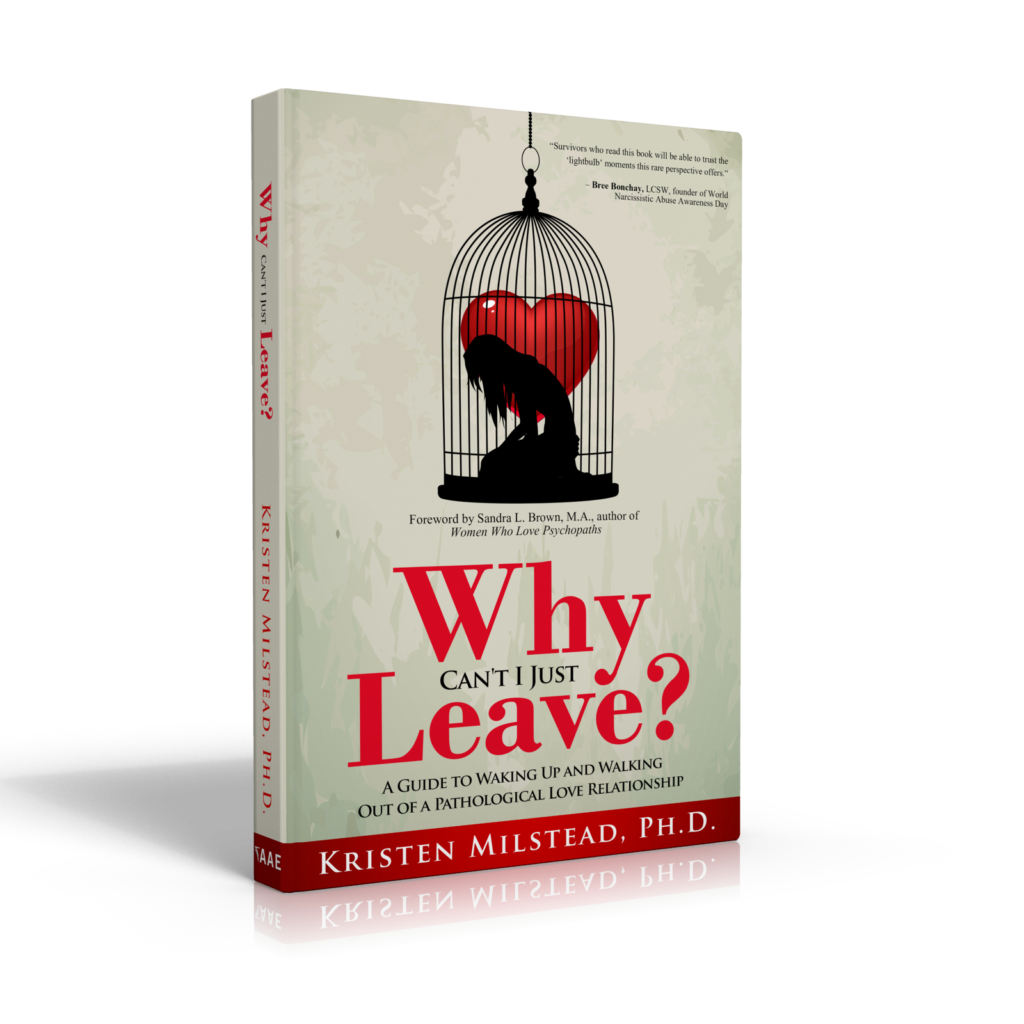I’ve come to believe that the love bombing stage that takes place early in a relationship with a narcissist is the most sinister and dangerous period in the entire relationship.
It’s discussed frequently, but usually only in conjunction with the other narcissistic abuse stages in the abuse cycle: idealization-devaluation-discard or sometimes (idealization-devaluation-discard-hoover).
It’s often not discussed on its own, because the other stages feel so much more intensely negative that it’s easy to ignore why love bombing is so bad.

What is Love Bombing?
The narcissistic abuse dictionary defines love bombing as:
“A period of intense positive attention from the narcissist that can include excessive flattery and declarations of love, mirroring, future-faking, gifts, sex, domination of the partner’s time, and fast-tracking the relationship. The result of these actions is an intense bond, where the partner becomes very vulnerable to, trusting of and dependent on the narcissist.”
It’s called love-bombing for a reason. Shahidi Arabi writes, “The idealization phase can only be described as pure, unadulterated ecstasy – both for the victim and the predator. Love-bombing – the excessive praise and flattery the predator showers on the prey – might as well be crack cocaine.”
I remember the moment I knew I was in love with my ex-boyfriend. It was in the midst of an intense love bombing period. I didn’t understand what love bombing was at the time, but it felt like a spiritual experience that I’d never felt in a romantic relationship before–one that spiraled downward in the months ahead.
Love-bombing takes place in the narcissistic abuse stage that comes first, the idealization stage. This is the stage in which you fall in love and form a bond with the narcissist.
It’s the stage where your partner draws you into a perfect world seemingly created just for the two of you that, after everything begins to deteriorate, you will yearn for the return of for the duration of the relationship.
Love bombing is often overlooked as dangerous because it’s so downright pleasant.
Yet that’s exactly why it should not be overlooked at all. It’s a set-up that is just as real, abusive, and destructive as any of the other stages of the relationship.
There are five reasons why this period so dangerous that I would argue it’s actually the most abusive of the entire relationship.

Love Bombing as Abusive Narcissistic Behavior
1. The love bombing is itself a false construction designed to manipulate us.
Although narcissists may actually believe they love you and may engage in acts and show emotions that look like love, their motivations are much different than those of the rest of us.
Narcissists and psychopaths do not want the same things out of relationships that the rest of us do. When we enter into relationships with them, we assume we are entering a relationship based on a foundation of trust, honesty, and respect in which we are valued for our individual selves and in which our needs and desires are important.
Narcissists, however, are extracting from the people they are close to the narcissistic supply needed to maintain their positive view of themselves. They will do whatever is necessary to get it.
This narcissistic behavior can include excessively flattering you, pretending to be interested in the same things that you are, mirroring your emotions and actions, lying about their pasts or their future intentions, and dominating your time and attention.
Yet it is all carefully crafted and purposely manufactured so that they can receive your love, attention, affection, adoration, and empathy, as they have deemed you a high-quality supplier of these things.
“The main difference between jerks and abusers is the idealize and grooming phase,” Jackson MacKenzie writes in Psychopath Free. “Most of us have no problem spotting nasty people– we avoid them. But psychopaths present themselves as your mirror image. A soul mate. They quickly declare that no one has ever made them so happy in their life– they compare you to past exes, holding you high above everyone else. They sniff out your vulnerabilities, insecurities, and dreams. And based on their findings, they transform their entire personalities to become your perfect match.”
Narcissists have learned that when they spin this web around their partners early, their partners drop their guard and make themselves vulnerable.
While we believe that we have found someone who accepts and loves us for who we are, someone who wants the best for us, they have learned how to manipulate our emotions to draw us closer so that we will provide them with the validation to their egos.
As soon as the real world steps in– as soon as you tell them “no,” or disagree with them about something, or want or need something that contradicts them, the mask will begin to slide, because the things they said to us and the way they treated us was conditional, based on how we treated them not who we actually are.
There may be glimpses of who they really are, tests we have to pass. They may tell us, “I’m a bad person,” to see how we react. Will we say, “No you’re not” and pull them close?
When they explode over the little things that feel like criticism to a narcissist, what will we do? For example, any of the following might incite narcissistic rage:
- telling them that you won’t cancel your plans to be them
- telling them that you don’t like horror films because they make you scared and don’t want to watch one with them
- telling them that you prefer to order something different on a menu than what they suggested
- not responding “quickly enough” to text messages
- pointing out a stain on their clothing
- disagreeing on which sports team should win a championship or speaking up at all when you have an alternate opinion on anything
- pointing out an error in their work or providing constructive criticism
- pointing out an inconsistency in their story
- asking them not to do something in a firm but fair manner (e.g., “I don’t like being tickled. Please don’t do it.”)
- crying or being upset about a lie that they told you
These scenarios and others feel like attacks or rejections to the narcissist.
Narcissists need the people around them to reflect back to them their own view of their “idealized” self.
Because, merely by you being yourself and living your life, you will inevitably do or say something that fails to make them feel perfect because it ignites shame or worthlessness, you will fall from the pedestal as they project it onto you.
If the narcissist explodes in rage and then attacks you over any of these things, will you walk away or will you think it’s a one-off? These incidents may start to occur slowly. They’re grooming you for their abuse.
The entire time that you were being real, truthful, and genuine, their love for you has been conditional– based only on whether you do what they want you to do.
The person presented to us by narcissists during the love-bombing stage isn’t real. It is a deception, a mask, worn for us in order to get us to open our souls and hand over our lives.
By telling us what we want to hear and weaving a false reality, they can then escape their own emptiness and use our genuine hearts to feel special and alive.
Love bombing is dangerous because it is used to steal our best selves and try to drain us of who we are.
2. The emotions generated in us by love bombing are weaponized against us.
Love-bombing is also dangerous because the narcissist uses what they learn about their partners to control them once they are in the relationships to keep them there.
Partners are groomed during the love-bombing phase to endure the other things narcissists do to us. They use our love against us. We start to feel crazy and perhaps look unhinged to others when describing their behavior.
Their instability results in instability on our parts as we are dragged along for the ride–and then we are blamed for it, as we repeatedly beg for rationality and answers, and they calmly point to our quest for those things as proof that we are the unstable ones.
3. We get cognitive dissonance and are unsure of how our partners can go from treating us like the love of their life to treating us like we don’t matter.
The first impression usually becomes the core belief and is the most resistant to change. The partner finds it difficult not to resolve the cognitive dissonance in favor of the positive view of the narcissist presented during the love bombing stage.
He or she will withstand abusive treatment, thinking there are logical reasons for it and believing the “true self” of the narcissist is the one presented at the beginning
4. We become likely to second-guess ourselves and take the blame when things go wrong in the relationship.
Narcissists have no problem letting us give them the benefit of the doubt time and time again and projecting their blame onto us.
We accept it because we have been groomed from the beginning to believe that we are with someone who is trustworthy and has our best interests at heart.
This is abusive! It is possible only because we have been love bombed from the beginning.
5. We can’t break up with our partners and if and when we do, we can’t get over them.
Partners romanticize the love bombing period of the relationship, may get “abuse amnesia,” and start to believe they will never have a connection with anyone like the one they had with the narcissist.
It can keep them ensnared in the relationship for a long time, unable to go no-contact, and even if they are able to break away, idealizing the relationship can keep them from moving on.
The narcissist walks in and out of our life when he or she wants to, storming out when we do something he or she doesn’t like or staging a fight. We walk on eggshells, wondering what will upset him or her “today.”
We can’t figure out why we can’t leave or stay away, even if we desperately want to.
When they are gone, we long for and miss them and don’t understand why.
Love-bombing almost always starts on day one, and it is part of the indoctrination that sets the stage for everything else that will take place in the rest of the relationship, and for the rest of our lives, as we institute no-contact and then maintain it.
H.G. Tudor, a self-aware narcissist, admits as much about the love-bombing when he writes,
“Your head will eventually accept what happened, that you were charmed, entranced and enchanted and you never stood a chance… Your heart will never accept that it was not real. That crack, that fracture, that tiny chink that remains from your frenetic and devastating time with me shall always remain. It is through it that I can return as I slip, shadow like into your heart through that unhealed wound. That is why we did what we did; so we always had a way back in… You will have to maintain that vigilance for the rest of your life. Our polluting influence, if ever allowed near you again, will creep and trickle through the hole that will never seal.”
Our own emotions are used to trap us into the relationship and then to make it difficult to ever escape this narcissistic behavior.
It seems clear that love bombing is just as abusive as any of the more obvious forms of abuse. This is when the sleight-of-hand takes place and the poison is slowly injected into us– one sweet drop at a time.
Partners need to heal from the trauma of the blatant abuse, but also from the sickness of that infection.
Want more? Please take a moment to sign up to get all future articles delivered straight to your inbox.
Don’t forget to check out these free resources:
Sources:
Arabi, Shahidi. “Love Bombing is Crack Cocaine.” Thought Catalog. Accessed May 12, 2018 at https://thoughtcatalog.com/shahida-arabi/2018/01/love-bombing-is-crack-cocaine-the-addictive-cycle-of-narcissistic-abuse/
MacKenzie, Jackson. (2015). Psychopath Free. Penguin Group, LLC.
Tudor, H.G. “The Devastation of the Illusion.” Knowing the Narcissist. Accessed May 12, 2018 at https://narcsite.com/httpnarcsite-com20161011the-devastation-of-the-illusion/






6 Comments
John
This material is transformative. I’ve been studying narcissistic abuse for a long time, and people who have actually gone through this kind of process know what they are talking about. Today, reading this, I realized a potential evolution for breaking the denial surrounding narcissistic abuse. My mother is a narcissist.
I suddenly realized that the maternity of my mother was love bombing. Further to that, I am beginning to understand now that all narcissistic abuse must be rooted in some kind of unhealed formative trauma bonding. Without any exception. A fused object relations soup that remains frozen (family fantasy trauma bond) and vibes out to the future narcissist like a WiFi signal.
Yet when sufferers of abuse talk about their own experiences, they may not realize that they are providing supply (or the promise of future supply) to the narcissist by not making the dot connect specifically to family, and that their family of origin did not and could not care about them (the real them), and that it wasn’t personal (that’s the problem). Thus the « cocaine level high ».
This dot connect isn’t being made. In fact the narcissist as being the source issue of the abuse is front and center. Exactly where the narcissist needs to be. Healing happens with the insight (subconscious) development slowly arriving. Protecting parents and the original false self set up is spontaneous and implicit. Held in the body.
L
over 30 years of marriage to a narcissist and I’m still breathing. I’ve been divorced 1 year. I’m struggling now because he got dumped by his girlfriend and he’s hoovering. I went no-contact, email only. I’m struggling with the emails now and that’s on me. Thank you much for all your articles each one helps me reset.
Karen
I’m not sure if this post was a masterpiece that encapsulated my experiences with a narcissist as if you were entirely psychic, or if all narcissists use the same formula for destroying the lives they touch.
After all, they do use what I call the 1-2-3 formula,
1. Love bomb
2. Detach, or start to distance themselves because of something we said or did, or didn’t say or do, or some slight we didn’t intend but still had to be punished over. Mind reading is also an ability they expect us to have, or else.
3. Anger, blame, gaslight, lie, cheat, project, and of course show us a little sugar now and then, as if to say, “Play your cards right and it can be like it used to be in the beginning.”
\
I discovered what works for me in maintaining no contact.
I chant “there was no there there, may as well have been a highly programmed bot.” Also, cheaters are like dogs who kill chickens–they get a taste for it and can’t stop themselves.
Most of all, I have adapted these four, unbendable boundaries. In any new (or established) relationship, I will give love, I will care, I will trust and I will give respect. and so will they, or I am out.
A narcissist has no idea what any of those verbs mean, so they can’t even pretend to give those things to a love partner.
I deserve more than a self absorbed robot who has to bleed others of their joy so they can steal it from us, try it on and when it doesn’t fit, throw it in the gutter.
Thank you, Kristen, for sharing the wisdom you’ve gleaned from your NPD experiences.
Ladia
I absolutely love your 4 boundaries, especially since you also DEMAND the same from your partner. You have really empowered me today. I am married to a narcissist who I am having a hard time divorcing. The strangest thing for me has been the fact that he is so blatant in his disrespectful and his disdain for me, but I can’t let go because of the success of the “love bombing ” that occurred at the beginning. I just knew that I had found the nicest, sweetest man on the planet. And for some reason, I think that he is hiding inside of himself and that it is MY responsibility to bring him back out. But with all of the other things going on in my life, such as being an essential employee in the middle of a pandemic, and hoping that I stay safe and healthy, I just can not afford to add emotional abuse to my list of battles. Enough is enough. Time to go no contact. I know that I need to be prepared for the hoovering that will inevitably occur.
Karen
Trust me, I tried everything in the book to get things on an even keel, but narcissists have to control everything, or else. I never even got to order what I wanted from a menu. The love bombing was exquisite and for so long I refused to believe I could possibly have been hoodwinked so thoroughly.
But, hey, there is good news I managed to harvest off the decayed remains of “our love.” I realized that I can be the most loving, faithful, creative, patient loved one, and I can feel love from every pore when I believe I am loved as much as I thought I was during the stage one Blitzkrieg bombing.
Even afterwards when Mr. Hyde came out, I still rationalized and believed the verbal abuse, lies and cheating all had some degree of plausible deniability.
I have gradually accepted that the ordeal of loving a narcissist is like surviving a plane crash or other life altering occurrence. I had to accept that all it takes is a few triggers coming too close together are enough to put me in a three-day funk.
It’s not like healing from a broken bone–it’s more like some funky emotional wound you cannot locate or fully treat. Time helps, and no contact is crucial if possible, but it’s like a heroin addict in recovery who winds up at at party with giant piles of the drug, plus all the gear to use it placed everywhere.
Though 80% of me wishes I never met the bozo, but 20% of me knows I never would have felt highs this high or sorrows this low without crazy pants. I never knew I could love anyone that much. Whoever gets me next will get a very good partner…as long as they are not NPDs.
Fredro
Nice post!